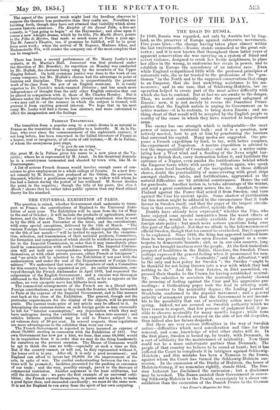THE UNIVERSAL EXHIBITION AT PARIS.
The question is raised, whether Government shall undertake to trans- port to France the contributions of England to the Universal Exhi- bition of next year. The Exhibition will be open from the 1st of May to the end of October' it will include the products of agriculture, manu- facture, and the fine arts. The list of intending exhibitors must be sent in by the 30th of next November at the latest, and the contributions, with some special exceptions, delivered by the 15th of March. "The various Foreign Governments "—so runs the official regulation, approved on the 6th of last month—" will be invited to appoint, for the examina- tion, selection, and transmission of their national products, Committees, the formation and composition of which should be notified as soon as possi- ble to the Imperial Commission, in order that it may immediately place itself, in communication with such Committees. The Imperial Commis- sion will not hold any correspondence whatever with the exhibitors themselves, or with other private persons' either French or foreigners " ; and "no article will be admitted to the Exhibition if not sent with the authorization and under the seal of the Departmental or Foreign Com- mittees." We understand that none of the members of such a Committee for this country have been appointed as yet. An earlier intimation, con- veyed through the French Ambassador in April 1853, had requested the cooperation of the English Government; and a circular was thereupon addressed to the British exhibitors of 1851: still, as far as appears on the surface, no very energetic move has hitherto been made.
The commercial arrangements of the French are in a liberal spirit. Foreign contributions, as soon as they reach the frontier, willbe forwarded to Paris at the expense of the Imperial Government, and in like manner sent back at the close of the Exhibition. The general, though not the particular requirements for the display of the objects, will be provided gratis. The current trade-price of any article may be affixed to it. In determining the customs-duties on such foreign goods as may eventually be left for 'interior consumption," any depreciation which they may have undergone during the exhibition will be taken into account ; and articles hitherto prohibited may be sold in Franee subject to an ad valorem duty of 20 per cent. In several respects, these regulations are more advantageous to the exhibitor than were our own.
The French Government is reported to have incurred an expense of about 70,000/. sterling in connexion with the Exhibition of 1851. Our own Government has now got a hint, we hear, that some 60,000/. would be in requisition from it in order that we may do the thing handsomely for ourselves on the present occasion. The House of Commons would be apt to think the sum no trifle—especially at such a time as this. But if the country cannot, or will not, be duly represented without it, the lesser evil is to pay. After all, it is only a good investment ; and England can afford to invest her 60,000/. for the improvement of the arts, in spite of war. The cordial understanding between the two na- tions will be promoted; facilities presented for the pushing or extension of our trade ; and the way, possibly enough, paved to the decrease of commercial restriction. Another argument is the least utilitarian, but still the decisive one : we gave the first example of an universal exhi- bition; the French exerted themselves, in person and in pocket, to make a good figure then, and succeeded excellently ; we must do the same now. It is not for England to run away from the spirit of her own conjuring.


























 Previous page
Previous page